Protesters had just begun to congregate in front of the Alabama Women's Center on a cool, sunny morning in late March when Dr. Willie Parker pulled up to the clinic.
"There they are," he said, reading aloud a protester's sign: "Prayer saves babies and lives."
The turn signal in his gold Mini Cooper clicked like a metronome as he pulled into the nearly empty parking lot, making sure he took a spot in the row farthest away from those who had come to plead with the abortion providers and women seeking their care to have a change of heart.
The last row meant safety. It meant Parker could slip into the clinic through the back door. Just before 11 a.m., three protesters gathered on a shady patch of sidewalk — a small crowd, according to Parker.
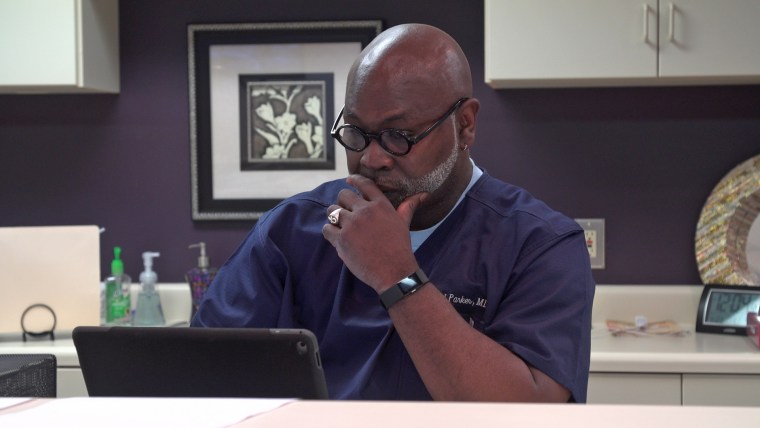
Abortions in Alabama have always been hard. For many providers in the south, it has always meant going through the back door.
Between 2010 and 2015, nearly 300 new regulations on abortion were introduced in states across the U.S. They seem to appear quicker than clinics can keep up.
With the current conservative grip on Washington D.C., abortion opponents are optimistic the procedure is closer than ever to being outlawed.
Parker is concerned that the opposition has a good reason to feel that way.
"This is the area of the country where ideologues, who have seized power, are farther along in institutionalizing opposition to abortion and creating barriers for women that are practically insurmountable, despite [Roe v. Wade] remaining in place," Parker told NBC News.
Almost 700 miles away in Washington D.C., Republicans teetered on a vote for a health care bill that would repeal the Affordable Care Act, and tighten restrictions on insurance plans that cover abortion. Weeks later, President Donald Trump would sign a legislation allowing states to withhold federal funds from Planned Parenthood and other abortion providers.
But Parker, 54, wasn't focusing on the possibility of new abortion hurdles as he made the hour and a half pilgrimage from his home in Birmingham to Huntsville, Alabama.
He had driven north, as he does every month — listening to Coltrane, Tupac or an audio book — to give Dr. Yashica Robinson, 40, some relief from her punishing schedule of performing abortions at the clinic and working at her private practice.
Robinson can't escape the protesters at either office, because in Alabama, Parker says, anyone who partakes in the process of performing abortions is isolated — a local pariah.
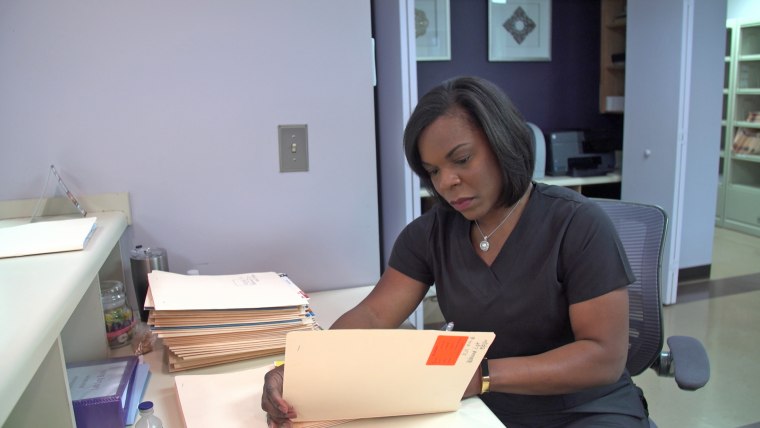
That hasn't stopped Parker, whose book "Life's Work: A Moral Argument for Choice" was released last month, from his 12-year crusade of performing abortions in the south. Driven by his faith, Parker zips from Birmingham to Huntsville to Tuscaloosa over to Mississippi and back on his mission.
He is a David fighting the conservative Goliath of the Trump administration and a re-energized opposition, who would see him either put out of business, jailed or dead.
"God is meeting both of us where we are"
David and Goliath isn't the biblical story that sparked the passion in Parker to become an abortion provider.
When he first became an OB-GYN, Parker didn’t perform abortions for his patients. As a fundamentalist Christian, he said he didn't know what it would mean to him to provide that type of care.
But after hearing a sermon by Martin Luther King, Jr about the good Samaritan, he changed his mind.
“In that story he basically says there was this person that needed help. No one else would help that person because they were afraid of what would happen to them,” Parker said. “And Dr. King said what made the good Samaritan good was that that person reverse the question of concern.”
Parker said the sermon resonated with him, recognizing he was seeing women daily who wanted to terminate unwanted pregnancies or pregnancies that were nonviable.
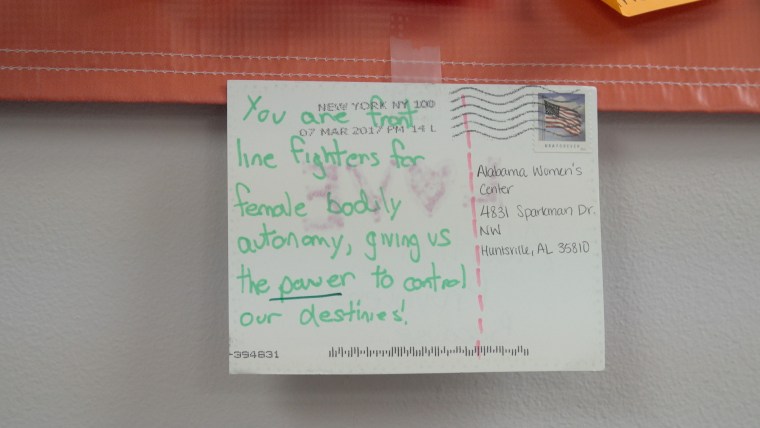
“I made the decision to become an abortion provider,” he said. “Being a person of faith that provides abortion care — what’s unique about it is that I’m open about it.”
And while Dr. Parker cites his faith as a driving factor in his career, it is also the driving force behind his fiercest opponents. At the Hunstville clinic, protesters come in handfuls, while at other clinics in the south they come in droves.
Parker said when he's threatened, he doesn't take it lightly. Since 1993, 11 people, including four physicians, have been killed in attacks on abortion clinics.
"I have to be very aware — and anybody who works here has to be aware — that there are some people, who in their religious understanding, can find a moral justification for harming someone who provides abortion," Parker said. "Because in their mind, abortion is murder."
But in Parker's religious understanding, he is the good Samaritan. He doesn't see abortion as a moral evil.
"It's a rebuttal of the notion that someone can be shamed into thinking that you are in a morally depraved place. Women should never feel that way about seeking the care that they deserve," Parker said. "When I'm with you and you need what I have, and we both feel divinely inspired and protected — God is meeting both of us where we are."
A Day in Huntsville’s Only Abortion Clinic
Thirteen appointments were scheduled at the Alabama Women's Center when Parker pulled into the almost empty parking lot.
Before the first procedure, Parker, Robinson, clinic owner Dalton Johnson, and Dr. Shandhini Raidoo, who had come to work at the Huntsville clinic for two weeks, gathered in an office in the back of the clinic.
Holding up a stack of paperwork thicker than his thumb, Johnson explained to Raidoo how at least once a month he had to search for the latest legislation that would be imposed on the clinic — one of five in the state.
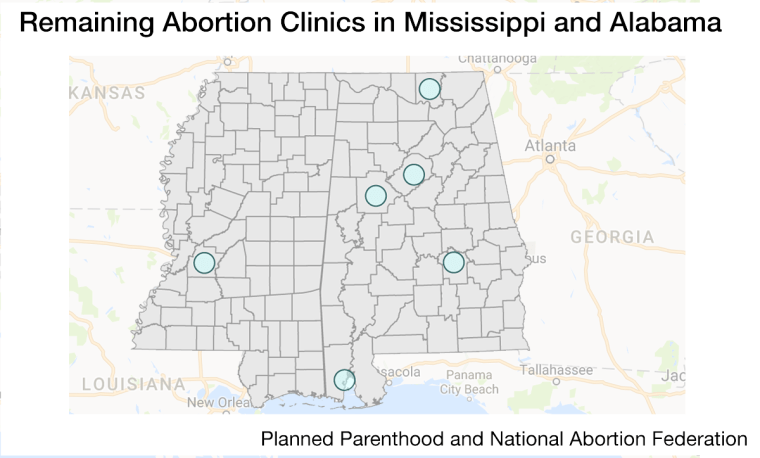
“When I first started back in 2001, it was maybe 20 pages. Look at it now. It’s ridiculous,” Johnson said. The state does not notify him of a change, he said, but rather it is his responsibility to check if a new regulation has been implemented.
He runs through the paper work — calling out ten dates over the last 14 years when regulations were either implemented or updated. He ends with the most recent: March 2017.
"They used to send out letters that say the rules have been updated, they're coming to an effective date on this date, but, luckily, I've just learned to check the state's website, like, once a month," Dalton said. "Because this [one] was on March 5, and they didn't even notify us."
One regulation required Johnson to install a fire-proof closet that holds items like toilet paper, sanitary pads and rubber gloves. It cost $20,000, he said.
Soon it was time to start seeing patients.
As he entered an exam room, Parker introduced himself to a woman who was five weeks pregnant. He said he tries to calm patients’ fears by giving them a rundown of what they can expect during the abortion.
"So what’s going to happen is they’re going to put some medicine in your I.V. It’s going to make you a little relaxed and a little drowsy," Parker told the patient. "It also has something in there to help make sure the cramps aren’t as strong."
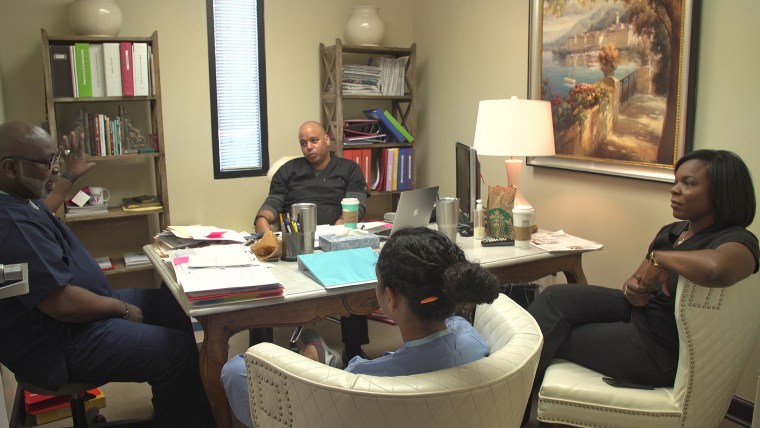
He told his patient after numbing her cervix, she would mostly just feel "pressure and touching." Parker explained he would use a tube to remove the pregnancy. She would then feel cramping.
"Everything's very, very short. It takes five minutes," he reassured her. "So pressure. Cramping. Five minutes — that's it."
The Conservative Grip on Alabama
In Alabama, a number of laws have gone through the state legislator, which have or have attempted to restrict access. In 2013, former Alabama Governor Robert J. Bentley signed into law the bill that required abortion clinics met the same standards as ambulatory surgical centers.
Another part of the law, which has since been deemed unconstitutional and overturned, said that doctors in Alabama must have admitting privileges to local hospitals in order to perform abortions.
Had that law stayed in place, Parker would be unable to provide abortion and travel.
One regulation said a clinic was required to be more than 2,000 feet away from a school. An injunction has halted that law. Otherwise, Alabama Women's Center, which is across the street from the Academy for Academics and Arts — a public magnet school, would have closed.
Another law that all clinics must comply with is a 48-hour waiting period between consultations and abortions. Parker said that means women who don't live near a clinic and can't afford to stay in the area overnight, take the day off work or pay to travel, aren't able to have an abortion.
Parker is also required by the state to provide patient's with the risks of the procedure — he must tell them, for example, the abortion will increase their chances of developing breast cancer, which he says is not supported by scientific evidence.
Currently, several bills are moving through the Alabama legislator. The "right to life" bill — which passed the 67-14 in the state's House on March 16 and was advanced by the Senate Health Committee — would write into the Alabama Constitution that unborn life is sacred. If passed by the full state Senate, Alabama residents will vote on it in 2018. However, the law would be largely symbolic unless Roe v. Wade is overturned.
George Barry, a deacon at Whitesburg Baptist Church in Huntsville,said he believes abortion is a state's rights issue, and suggested Roe v. Wade should be overturned in the same way Dred Scott v. Sandford was overturned.
"That was really what happened at the Dred Scott decision," Barry said. "And they overturned Dred Scott to say the federal government cannot determine what is a human life. And so now that Dred Scott was turned over in the 1800s, we pray that in the future, that [the] Supreme Court will overturn the Roe v. Wade."
Abortion and the Trump presidency
President Trump has expressed that he would like the issue to go back to the states, too.
But Parker said that is not an option for all women.
"One of the things that people don't realize is that when abortion's legal or illegal, the number of abortions don't really change," Parker said. "... before 1973 and after 1973, relatively speaking, the number of abortions didn't change. But what did change is mortality related to abortion."
He said pre-Roe, statistics show the women who died the most frequently from abortions were women of color.
"When women start to die again from unsafe abortion because it's illegal, the women who will be dying will be black and brown women and poor women," Parker said.
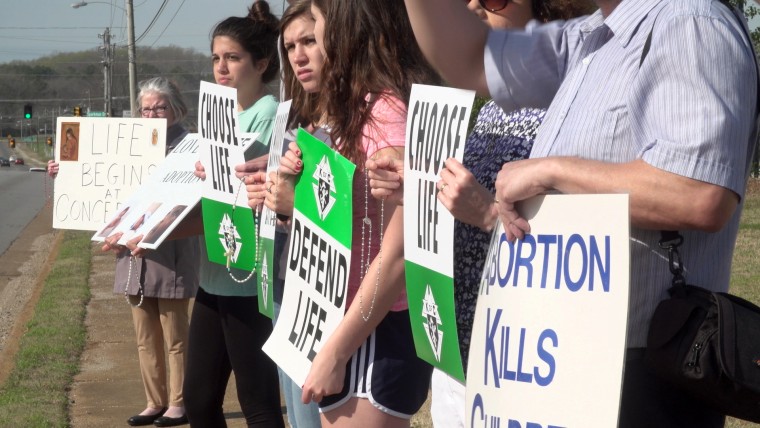
Parker worries about what the Republicans in Congress and the Senate will be capable of doing to abortion in tandem with the Trump administration.
"We have both sides of the legislative branch that are politically opposed to reproductive rights. And we now have the possibility that the Supreme Court will be shifted to the point where they would overturn a challenge to Roe," Parker said. "So all the stars are lining up perfectly to deny women access and to create a situation where we can see unnecessary deaths related to abortion the way we did before Roe."
With the Trump presidency still in its infancy and already reversing Obama-era abortion protections, Parker knows doctors like him still have a long fight ahead of them.
"We Have Been Praying"
Fridays are the busiest days for vocal abortion opponents at the Alabama Women's Center, clinic owner Johnson says.
On an afternoon in late march, four protesters arrived to hold signs in front of the Alabama Women’s Center as traffic whizzed past on Sparkman Drive. More than a dozen supportive drivers honked as they passed.
A 74-year-old protester named Dianne, who declined to give her last name out of fear of persecution, was among the group.
"Well, considering that I think abortion is murder, I think the tide is turning. More and more people are arriving at the same conclusion I am ... I'm an imperfect grain of sand. But millions of people who believe that we are a Christian nation, we have been praying. And as a result, we got an entirely different administration," Dianne, who voted for President Trump, said.
When the protesters come out, so do the clinic escorts.
The clinic escorts, like Josie Poland, have nicknames — many of them expletive-laden — for those who show up to picket the clinic on a weekly or monthly basis.
"Sneaky Pete," and "Pervert," are two of the protesters Poland says she looks out for.
Sitting in lawn chairs under the Alabama sun, three escorts wearing neon pink vests are armed with only a single black speaker from which they can play music if protesters become too rowdy.
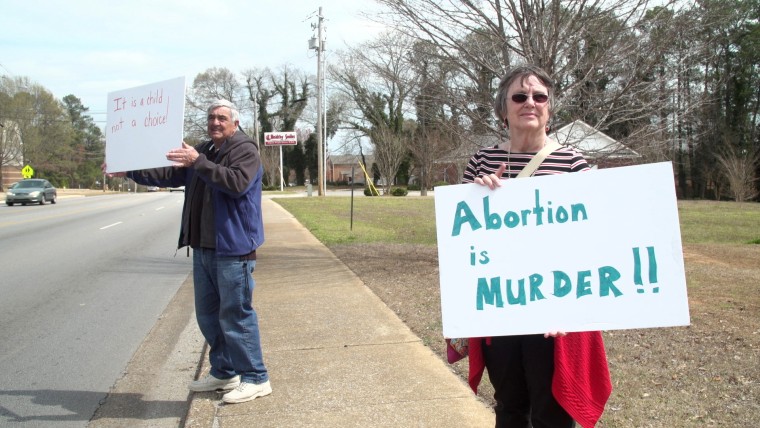
When patients arrive, the escorts use rainbow umbrellas to shield the women from picketers, who sometimes record the arrivals on their phones.
The Good Samaritan
Parker was about to bite into a buffalo wing when the news broke.
He paused in the kitchen of the Alabama Women's Center, container of blue cheese between his fingers, as a headline appeared on a television showing CNN:
"GOP SOURCE: NO VOTE TONIGHT ON HEATH CARE BILL," it said.
A laugh shot from Parker's lips like a starting gun. “They don’t have the votes,” he said, reveling in a rare moment of victory.
Parker knows he would have it easier if he practiced his profession elsewhere — that he wouldn't have to fight battle after battle with legislators if he just went up north.
But, working at the front lines of the abortion debate, challenging each new hurdle, is where he feels he is meant to be.
"I was not of the age of accountability during the civil rights movement. I was not born into slavery. I was not born during the labor rebellions of the '20s," Parker said. "In 2017, I'm a women's health provider. This is my time and this is my responsibility."
